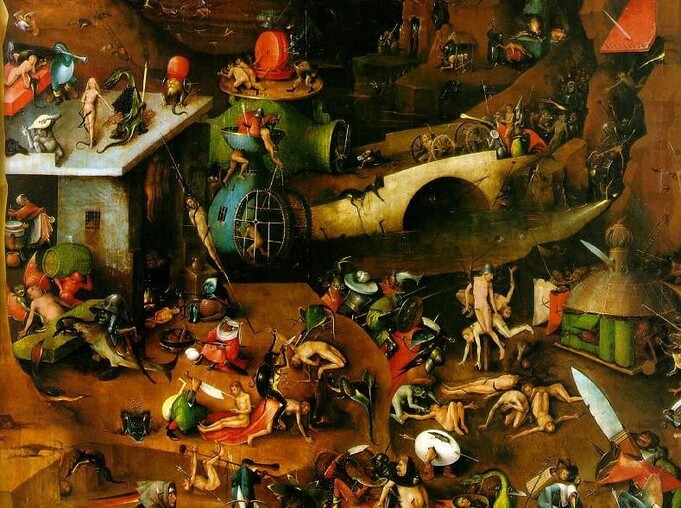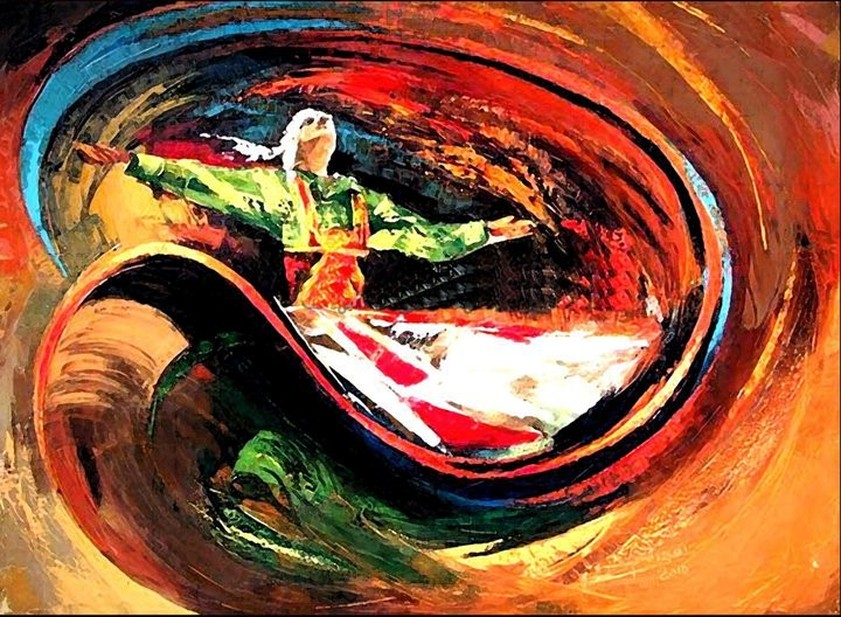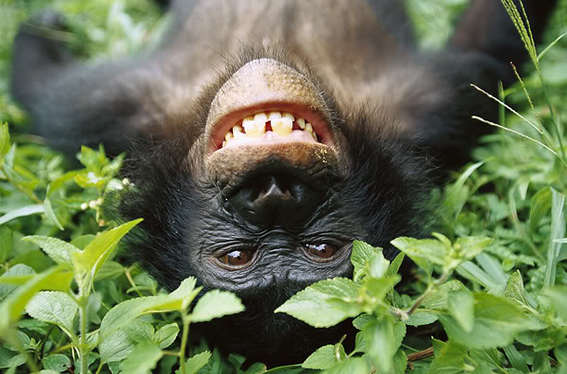 The Last Judgment, 1482, Hieronymus Bosch The Last Judgment, 1482, Hieronymus Bosch Sitting on the front porch this morning, surrounded by rain and warmed with my first cup of coffee, a friend of my daughter walked through our gate obviously upset. I asked her, "is everything ok?" She sat down in the chair opposite me and proceeded to tell me about her recent experiences with the (almost) men in her life. I say "almost" because although they may be men legally, they are, for all intents and purposes, still boys. Or they are very young men who haven't yet moved fully into their male adulthood. Like her, they are in that threshold place, where their bodies are fully developed but their minds and emotional intelligence are still developing. You know, the early twenties. As I talked to her about the challenges of being in a small town, the mating dance, and political history (yes, I'm that kind of mom) she visibly brightened and the conversation ended with her on the couch with one of our cats curled up on her belly. She's falling into sleep that will undoubtedly take her to places where she will do battle with the demons of heartbreak. We've all fought this battle in the dreamworld and lived to tell the tale, but I don't think that makes it any easier in the daily scheme of things. As I sit here in reflection, I drift back to my own twenties and early thirties, remembering the mating dance we all learn through trial and error, metaphorically stepping on the toes of our partners and sometimes (well, maybe more often than that), tripping and falling flat on our face in front of a large crowd. I never did do anything small and inconspicuously although I've often dreamed of it...now I sit on the other side of that dance, not watching from the sidelines, but no longer strapped to the need to breed. Does this feel like freedom? Damn straight it does and it reminds me of a passage from Plato's “The Republic” (1852 translation), which quotes Cephalus: "…I may mention Sophocles the poet, who was once asked in my presence, ‘How do you feel about love, Sophocles? are you still capable of it?’ to which he replied, ‘Hush! if you please: to my great delight I have escaped from it, and feel as if I had escaped from a frantic and savage master.’ " (1) It's important to keep in mind that "love" means "sex" in the ancient wording and although I don't agree with the notion that sex (or love for that matter) are to be escaped but rather enjoyed, I do understand the underlying message: when we are of prime breeding age, we are as if chained to a raging tiger that determines our actions whether we like it or not. And I am so very happy to ride freely when I want, rather than never getting off the damn ride. For thirty-odd years (10,000 days) I was bound to that wildcat and now I can ride when I want and walk alongside her when I feel like placing my feet firmly on the ground. I've actually spent a fair amount of time analyzing the phenomenon of mating and breeding. It really began with my nascent deconstruction of social mores, such as religion and law. In those early analyses I saw clearly that to control the body and its most basic drives--the need for food, affection and other body expressions, the drive to procreate--is to control the individual, lock, stock, and barrel, which is what most religions and laws attempt to do. We are told what is acceptable, what is not, and what you might burn in the eternal flames of hell for doing (as a recovering Catholic, this last possibility was a particularly strong impetus for not questioning the rules and regs. I mean, who wants to be tortured and raped for all eternity like one of Hieronymus Bosch's horrific paintings?). I suppose those early patriarchs needed to make resistance seem really bad, I mean horrific, in order to convince those who had embraced equality and pleasure for ten thousand years that they needed to forget all that and join up with this new misogynist worldview. If we didn't go willingly to our mutual demise, then by god we'd burn, either to death, or in the eternal afterworld. The unfortunate individuals who lived about 6,000 years ago were thrust into a world where women were forced to give up their rightful place as equals and carry the burden of responsibility for everyone's suffering because of their biological make-up. Naturally, they refused to submit to this insanity and the ones who got away fled to distant shores, bringing the ancient wisdom with them, which they passed on from generation to generation for millennia, one that was represented as a snake. The Canaanites/Phoenicians worshipped many gods and goddesses, but premier among them was Astarte/Ishtar, the fertility mother of the fertile crescent. She was depicted holding a snake in each hand. So, naturally, this new "devil" named lucifer had to take the shape of a snake. This story has repeated itself for almost 6,000 years and each time the goddess was forced into submission, the hatred of the sacred feminine morphed into self-hatred and torment. The one male god is egotistical, if not downright narcissistic, and requires absolute submission. How in the hell else do you force people to deny their very natures? Their very DNA? We share 98.7% of the same genetic make-up with our closest cousins, the bonobos (Pan paniscus) and the chimpanzees (Pan troglodytes); according to some studies we have more in common with our bonobo cousins. From the Primate Fieldnotes (2): "Based on 54 gene regions, Homo-Pan genetic distance range from 6.92 to 7.90×10−3 substitutions/site (P. paniscus and P. troglodytes, respectively), which is less than previous estimates based on large scale sequencing of specific regions such as chromosome 7. In other words, bonobos appear to share 12.4% more DNA in common with humans than chimpanzees do. This is more than twice the genetic divergence in squirrel monkeys (genusSaimiri) and adds further evidence suggesting that bonobos are a better model for understanding our common ancestor than chimpanzees are." The primary differences between our two closest cousins are that bonobo communities are matriarchal where sex is free and open to all; chimps use warfare to settle conflict and only the alpha male can mate; female bonobos create strong emotional bonds, which they use to maintain social dominance over the males and have generally peaceful communities. Chimps keep rigid boundaries over their areas and will kill other chimps to uphold these boundaries, where bonobos will mate, even across borders, to keep the peace. Chimps use tools and bonobos don't (at least not in captivity). Taking these differences--and our genetic similarities--into consideration is a compelling thought game, don't you think? If we combine this biological trajectory with, for example religion, we can see the chimp and the bonobo behaviors play out historically. This is particularly appropriate for the patriarchal monotheisms, such as Christianity, Judaism, and Islam and their stories of war and male dominance. It's as if they are the human evolution of the chimp, whereas those religions and cultures, both current and historical, that recognize the goddess or some other form of the sacred feminine could be seen as descendants of the bonobo. Let's keep in mind that this is my attempt at understanding just how we could have evolved into a world of war, male dominance, and militarization on a biological level. Obviously capitalism and a hoarding mentality play into this equation, but personally, I see these two things as simply other expressions of the original quandary: why do we ignore our biological nature? First answer: because male dominated religions have forced us to ignore our primal urges and needs in the name of piety. Second answer: perhaps our split off the evolutionary branch from our closest cousins, the bonobos (this happened about 2.5 million years ago, they then diverged from the chimpanzees around a half million years after that (3)), included enough genetic material that humans brought a predisposition for one or the other with them... So, I figure some of you are thinking, what the hell is she talking about right about now, I thought we were talking about love and mating, but ride this mind wave with me because I just know it's leading somewhere that might give us a way to deal with heartbreak. The way I see it is like this: we are animals, primates to be specific. We send out pheromones when we are of breeding age, we breed to carry on the species, it's like a built-in, biological imperative. Not all humans need or have a desire to breed, but about 75% of the world does so on a regular basis. Those who have seed to share, often do so generously, or feel compelled to, and some do not. Let's keep in mind that those little swimmers aren't the most resilient human, albeit infinite, product, so it seems an evolutionary step to manufacture and release as much as possible, "knowing" that their survival rate is pretty slim. Those who are born with a finite number of repositories (about 1-2 million) for that never-ending supply of swimming genetic code, can generally only make one at a time (sometimes two or three). In addition, once born, the small baby humans require constant care as they are utterly incapable of survival without it. This basic biological process has been twisted and humans made to suffer at the hands of a warped worldview that is hell-bent on controlling this simple biological process in the name of power and greed. If I consider my own history as a sexual being, particularly in my 20s, I had absolutely no desire to breed and often "broke hearts" because of it. But I honestly believe part of my strong libido was tied to an unconscious desire to do just that. I can only say this now that my body's breeding phase is complete. I watch others and I feel as if I'm reading a book I've read a hundred times before. How many times have I heard individuals say, "I thought it was more than just sex" when it felt that way for a brief period and their partners saw it as "just sex." How much of that dynamic is socially constructed and how much is a biological drive? How would we react if we hadn't been convinced very early on that lifelong monogamy is natural? Perhaps the breeding drive would run its course and then we would move on, sharing a safer, warmer, and stronger community for having shared the process--like our bonobo cousins. Maybe the notion of "love" is a social construction based on the need to breed. Perhaps some humans have a predisposition for behaviors that more resemble our chimpanzee cousins and others like the bonobos. Or maybe some people mate for life, like some animals do. Perhaps it's an individual combination of genetic code and social conditioning that is as unique as each person. But what do I know? Not much really, but I do believe that more sex and more love will get us to a place where we might understand it all better and return us to our original selves. I am absolutely sure the insecurity created by religion (and advertising for that matter, but that's a whole other conversation...) is something that must be deconstructed by each person, male or female, in order to return to a more authentic human experience. ...to be continued
1 Comment
|


 RSS Feed
RSS Feed